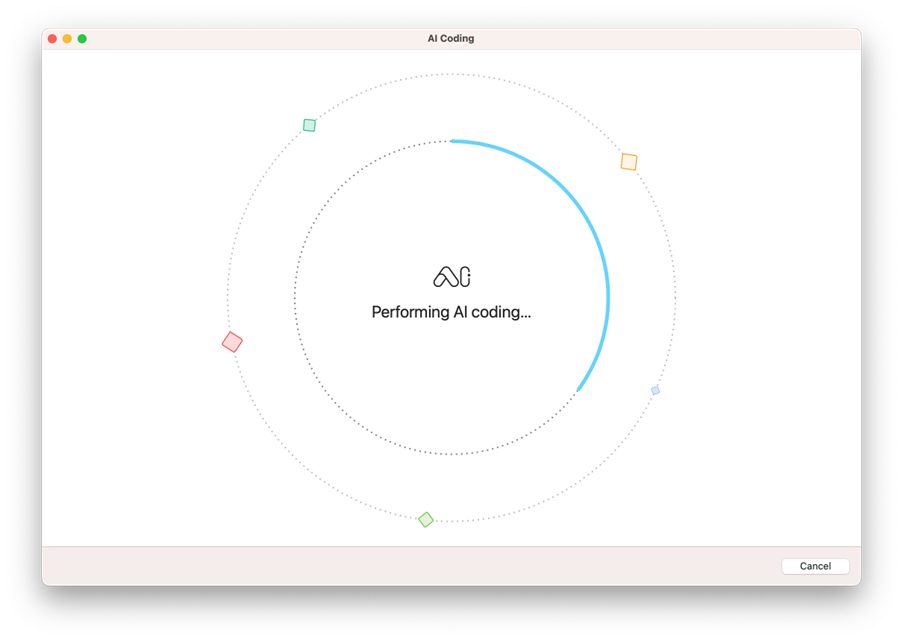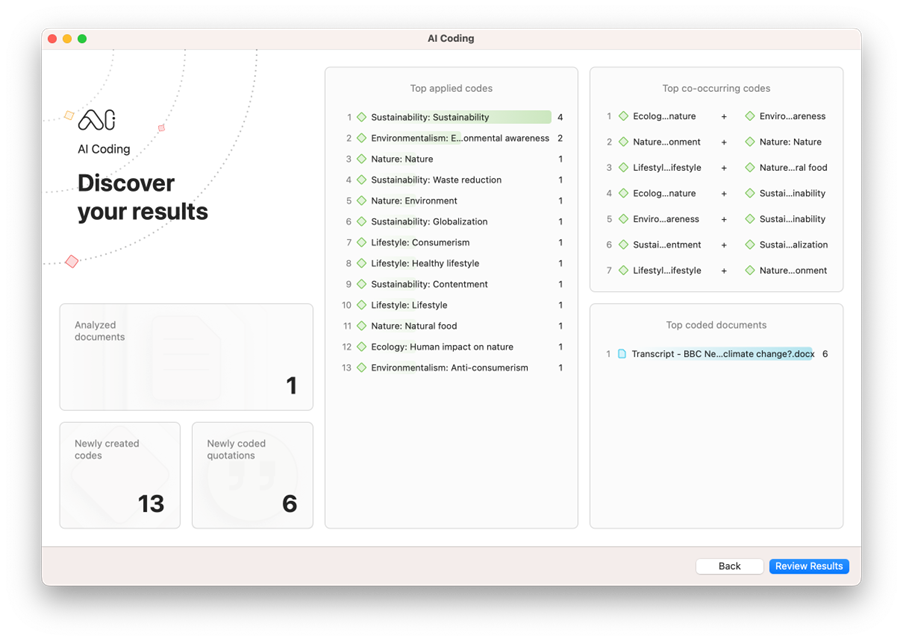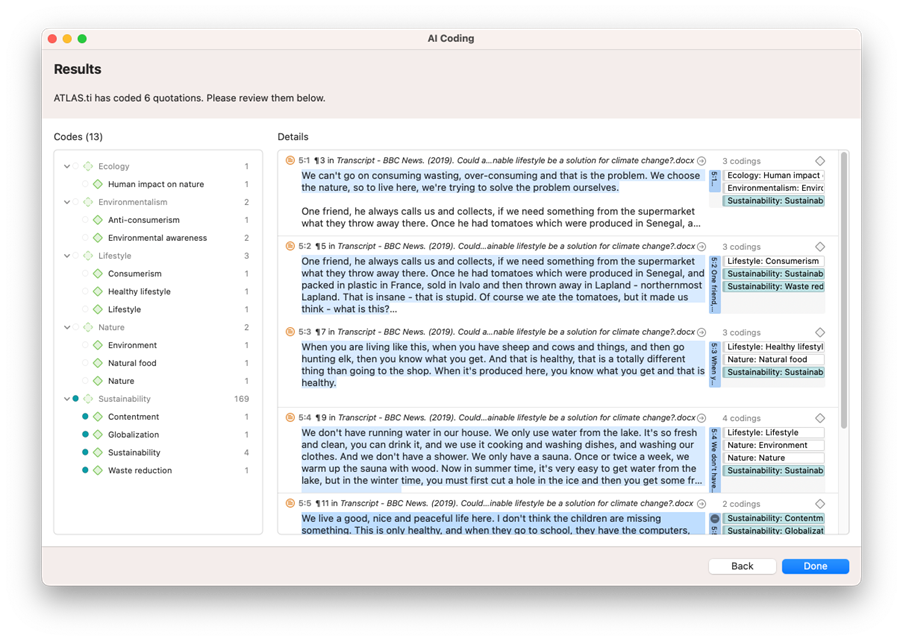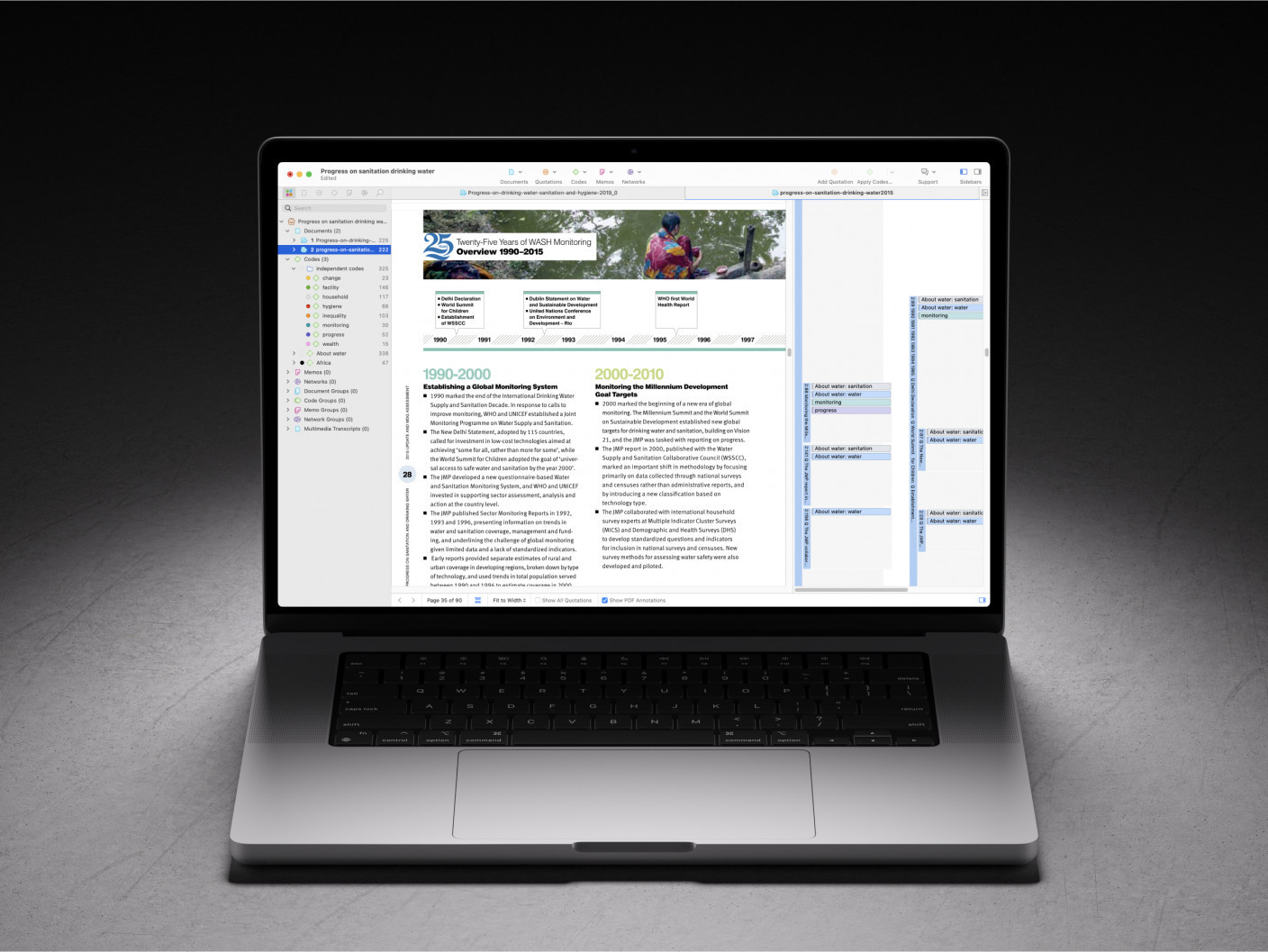The Modern Qualitative Researcher's Ally: AI Coding Beta, Your New Thinking Partner
As the realm of qualitative research continues to evolve and expand, new and innovative methodologies have been integrated into our research practices to streamline analysis processes and enhance outcomes where possible. Among these developments, a tool that is steadily gaining recognition for its potential in reshaping the way we approach qualitative data is AI Coding Beta. However, this tool is not presented as a catch-all solution or a substitute for the researcher's role. Instead, consider it as a cooperative aide, a tool that assists but does not perform the task by itself. “Since each qualitative study is unique, the analytical approach used will be unique” (Patton, 2002, p. 433), and it is up to us to decide how the tools at our disposal can be helpfully used.

AI Coding Beta is a heuristic device rooted in artificial intelligence, designed to aid us in familiarizing ourselves with our data. Like a trusted friend assisting in navigating through a vast landscape of qualitative data, AI Coding Beta helps categorize, interpret, and make sense of data. See it as a companion that can understand text very well and tell you a lot about the data, but it does not yet know the intentions you as a researcher may have. Many researchers start coding by paying attention to very fine details and later evolving these codings into emergent categories that represent higher degrees of abstraction (Benaquisto, 2008), and now AI Coding Beta can assist with initial cycles of coding to “retrieve and categorize similar data units” (Miles et al., 2020, p. 63). Still, unlike a human friend, AI Coding Beta possesses the capacity to handle any amount of data without getting overwhelmed or tired.
A hallmark of qualitative analysis is its unique potential to generate novel insights by exploring what inductively emerges from rich data (Creswell, 2007). Analytic induction seeks to answer what kind of event, activity, situation, or attribute is present in the data (Preissle, 2008). The principle behind AI Coding Beta is to alleviate the often tiresome and complicated task of coding qualitative data. Leveraging machine learning algorithms trained on vast datasets, AI Coding Beta can help us identify patterns, themes, and categories in our data. It is akin to a knowledgeable friend who can suggest potential codes based on the substance of your data.
Many qualitative methodologists advocate for simultaneous involvement in data collection and data analysis to allow us to discover new ideas in our data and then collect additional data to further explore these emergent ideas (Miles et al., 2020). The initial codes from AI Coding Beta are provisional (i.e., subject to change) but nonetheless helpful for mining data and identifying any gaps that can be filled with additional data collection. This way, we can continue collecting and analyzing data until we have sufficiently saturated each of our theoretical categories or no new theoretical insights are revealed (Charmaz, 2006).
An important concept in this process of discovery is serendipity, or unintentionally finding something of value, which can occur in an unexpected place or manner (Stebbins, 2008). When researchers find something intriguing, surprising, or disturbing, this can signal a serendipitous finding that the researcher had not initially expected or explicitly sought. Computer-assisted qualitative data analysis software (CAQDAS), such as ATLAS.ti, can make serendipitous connections more accessible to researchers as they can easily explore patterns among codes and data (Maietta, 2008).

In initial cycles of analysis, it is valuable to try “to open up the meaning in the data” (Tracy, 2013, p. 189). However, we might naturally miss some things in the data simply due to fatigue or the particular worldview with which we approached the data. We might need to dedicate a significant amount of time to this initial coding, because this can range from capturing “every empirical and conceptual occurrence in each line” to coding whole paragraphs (van den Hoonaard & van den Hoonaard, 2008, p. 187). Processing data can take three to five times as much time that was needed to collect that data (Miles et al., 2020). CAQDAS, such as ATLAS.ti, can greatly facilitate data management and coding (Yin, 2011). In the laborious process of qualitative coding, AI Coding Beta can serve as a dutiful assistant. It can illuminate potential coding pathways that might have otherwise remained unnoticed.
Any set of data can be interpreted in many different ways, and this can vary by the researcher, approach being followed, or what aspects of the data happen to stand out in a given moment of analysis. For example, both the researcher and the participants are embedded in their own contexts that invariably shape their perceptions and experiences (Braun & Clarke, 2013), such that two researchers looking at the same data may interpret it in very distinct manners. Moreover, the “same event, incident, activity, or representation in the data may be coded in multiple ways” (Benaquisto, 2008, p. 87) and thus lead to different findings. It is also important to remember that “qualitative research, as a set of interpretive activities, privileges no single methodological practice over another” (Denzin & Lincoln, 2018, p. 46). Thus, rather than seeking a “right” or “wrong” way to conduct this initial coding, what is crucial is to remain open to various possible directions in which the analysis could move to help us construct answers to our research questions.
Nevertheless, emphasis must be placed on the fact that AI Coding Beta, despite its advanced capabilities, is a tool and currently not a replacement for human discernment and intuition. AI Coding Beta lacks the profound understanding and instinctive grasp of the data that we, as researchers, embody. Hence, it should be seen as an assistant without intention or understanding of complex interrelationships, but it cooperates with you, suggesting possible interpretations, and challenging your reasoning simply by showing codes that closely reflect the contents of the data, thus facilitating a more profound engagement with your data.

Our primary goal with AI Coding Beta is not to automate qualitative research but bolster it with automated tools. We envisioned a tool that could help researchers steer through the vast sea of qualitative data, a friend ready to lend a hand when the waves roll high. However, it is your hand that guides at the helm, your intellect that discerns the subtle undertones of your data, and your insights that transform raw data into valuable knowledge.
You can choose to let AI Coding Beta mine through your data, and then you can assess which categories and sub-codes suit your research question by reading the attached quotations. You can also merge sub-codes or categories and delete any unnecessary codes. Instead of spending weeks foraging through your data, you can grasp your data in a matter of days. For example, a user doing research in investigative journalism turned to us because he had 20,000 documents but just didn't have the time to comb through them to pick out relevant content. With AI Coding Beta, he was able to identify relevant codes and move forward in his investigative article. AI Coding Beta can thus help you move out of the quagmire and take back control at the helm of your research.
As we continue to refine and enhance AI Coding Beta, we eagerly look forward to feedback from the broader research community. Your experiences, observations, and recommendations will be invaluable in shaping the future of this tool. You can always reach out to the ATLAS.ti team via live chat, telephone, and email, 24 hours a day, 5 days a week. We are happy that everyone can test AI Coding Beta, and we are learning a great deal from expert methodologists who are offering their valuable time and effort to critique and share their comments about this beta version. With all the invaluable help from this enormous community of researchers, ATLAS.ti will continue improving. We always strive to keep ATLAS.ti at the forefront of research technology. We thank the wonderful community of researchers who are beta testing AI Coding and helping us always learn and grow. We hope that AI Coding Beta proves to be a useful companion for everyone in their research journeys, sparking serendipitous thinking and enhancing possibilities to derive meaningful insights from qualitative data. We will do everything we can to continue incorporating the best and latest technologies available on the market into ATLAS.ti. This is just the beginning.
References
- Benaquisto, L. (2008). Codes and Coding. In The SAGE encyclopedia of qualitative research methods (ed. Lisa Given) (Vol. 1–1–2). SAGE Publications, Inc.
- Braun, V., & Clarke, V. (2013). Successful qualitative research: A practical guide for beginners. SAGE.
- Charmaz, K. (2006). Constructing grounded theory: A practical guide through qualitative analysis. Sage Publications.
- Creswell, J. W. (2007). Qualitative inquiry & research design: Choosing among five approaches (2nd ed). Sage Publications.
- Denzin, N. K., & Lincoln, Y. S. (Eds.). (2018). The SAGE handbook of qualitative research (Fifth edition). SAGE.
- Maietta, R. C. (2008). Computer-Assisted Data Analysis. In The SAGE encyclopedia of qualitative research methods (ed. Lisa Given) (Vol. 1–1–2). SAGE Publications, Inc.
- Miles, M. B., Huberman, A. M., & Saldaña, J. (2020). Qualitative data analysis: A methods sourcebook (Fourth edition). SAGE.
- Patton, M. Q. (2002). Qualitative research and evaluation methods (3 ed). Sage Publications.
- Preissle, J. (2008). Analytic Induction. In The SAGE encyclopedia of qualitative research methods (ed. Lisa Given) (Vols. 1–2). SAGE Publications, Inc.
- Stebbins, R. A. (2008). Discovery. In The SAGE encyclopedia of qualitative research methods (ed. Lisa Given) (Vol. 1–1–2). SAGE Publications, Inc.
- Tracy, S. J. (2013). Qualitative research methods: Collecting evidence, crafting analysis, communicating impact. Wiley-Blackwell.
- van den Hoonaard, D. K., & van den Hoonaard, W. C. (2008). Data Analysis. In The SAGE encyclopedia of qualitative research methods (ed. Lisa Given) (Vol. 1–1–2). SAGE Publications, Inc.
- Yin, R. K. (2011). Qualitative research from start to finish. Guilford Press.
How to cite "The Modern Qualitative Researcher's Ally: AI Coding Beta, Your New Thinking Partner"
APA (7th edition)
Kalpokas, N. (2023). The modern qualitative researcher’s ally: AI coding beta, your new thinking partner. ATLAS.ti Research Hub. https://atlasti.com/research-hub/the-modern-qualitative-researcher-s-ally-ai-coding-beta-your-new-thinking-partner
MLA (9th edition)
Kalpokas, Neringa. “The Modern Qualitative Researcher’s Ally: AI Coding Beta, Your New Thinking Partner.” ATLAS.ti Research Hub, 2023, https://atlasti.com/research-hub/the-modern-qualitative-researcher-s-ally-ai-coding-beta-your-new-thinking-partner.
Chicago (17th edition)
Kalpokas, Neringa. “The Modern Qualitative Researcher’s Ally: AI Coding Beta, Your New Thinking Partner.” ATLAS.ti Research Hub. 2023. https://atlasti.com/research-hub/the-modern-qualitative-researcher-s-ally-ai-coding-beta-your-new-thinking-partner.






